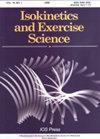Effect of novel diagonal stretching combining trunk rotation and trunk flexion on contralateral knee extension
IF 0.6
4区 医学
Q4 ENGINEERING, BIOMEDICAL
引用次数: 0
Abstract
BACKGROUND: Most previous studies have focused on increasing hamstring flexibility when knee extension range of motion (KE ROM) is restricted. However, it was demonstrated that the tensile force generated in the upper body could be transmitted to the contralateral lower extremity. OBJECTIVE: This study examined the effect of novel diagonal stretching combining trunk rotation and trunk flexion on the contralateral KE ROM. METHODS: Two different positions (sitting with a neutral pelvis position and sitting with trunk rotation) were randomly selected and the contralateral and ipsilateral KE ROM was measured in each position. As for the stretching intervention, trunk rotation and slight trunk flexion were applied in sitting with a neutral pelvic position. RESULTS: On the contralateral side, KE ROM was significantly different in all pairwise comparisons (p< 0.001). On the ipsilateral side, a significant difference in KE ROM was only observed between measurements taken after stretching compared to measurements taken during trunk rotation (p= 0.005). CONCLUSIONS: The tensile force in the upper body significantly affects tissue extensibility in the lower extremity in the contralateral side, leading to the restriction of active maximum knee extension. Diagonal stretching techniques may successfully enhance mobility in the contralateral leg.结合躯干旋转和躯干屈曲的新型对角拉伸对对侧膝关节伸展的影响
背景:以前的大多数研究都集中在当膝盖伸展运动范围(KE ROM)受到限制时增加腘绳肌的灵活性上。然而,研究表明,上半身产生的张力可以传递到对侧下肢。目的:本研究观察躯干旋转和躯干屈曲相结合的新型对角拉伸对对侧KE ROM的影响。方法:随机选择两个不同的位置(骨盆中立位和躯干旋转位),测量每个位置的对侧和同侧KE ROM。至于伸展干预,躯干旋转和轻微的躯干屈曲应用于中性骨盆位置的坐姿。结果:对侧的KE-ROM在所有配对比较中都有显著差异(p<0.001),仅在拉伸后的测量值与躯干旋转期间的测量值之间观察到KE ROM的显著差异(p=0.005)。结论:上身的张力显著影响对侧下肢的组织延展性,导致膝关节活动最大伸展受限。对角线拉伸技术可以成功地增强对侧腿的灵活性。
本文章由计算机程序翻译,如有差异,请以英文原文为准。
求助全文
约1分钟内获得全文
求助全文
来源期刊

Isokinetics and Exercise Science
医学-工程:生物医学
CiteScore
1.20
自引率
14.30%
发文量
37
审稿时长
>12 weeks
期刊介绍:
Isokinetics and Exercise Science (IES) is an international journal devoted to the study of theoretical and applied aspects of human muscle performance. Since isokinetic dynamometry constitutes the major tool in this area, the journal takes a particular interest in exploring the considerable potential of this technology.
IES publishes studies associated with the methodology of muscle performance especially with respect to the issues of reproducibility and validity of testing, description of normal and pathological mechanical parameters which are derivable from muscle testing, applications in basic research topics such as motor learning paradigms and electromyography. The journal also publishes studies on applications in clinical settings and technical aspects of the various measurement systems employed in human muscle performance research.
The journal welcomes submissions in the form of research papers, reviews, case studies and technical reports from professionals in the fields of sports medicine, orthopaedic and neurological rehabilitation and exercise physiology.
 求助内容:
求助内容: 应助结果提醒方式:
应助结果提醒方式:


